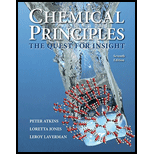Solutions for Chemical Principles: The Quest for Insight
Book Details
Written for calculus-inclusive general chemistry courses, Chemical Principles helps students develop chemical insight by showing the connections between fundamental chemical ideas and their applications. Unlike other texts, it begins with a detailed picture of the atom then builds toward chemistry’s frontier, continually demonstrating how to solve problems, think about nature and matter, and visualize chemical concepts as working chemists do. It also offers an exceptional level of support to help students develop their mathemetical and problem-solving skills.
For the new edition, Chemical Principles now takes a modular approach, with coverage organized as a series of brief Topics within 13 major areas of focus, including a refresher on the fundamentals of chemistry and an online-only section on techniques.
Sample Solutions for this Textbook
We offer sample solutions for Chemical Principles: The Quest for Insight homework problems. See examples below:
More Editions of This Book
Corresponding editions of this textbook are also available below:
